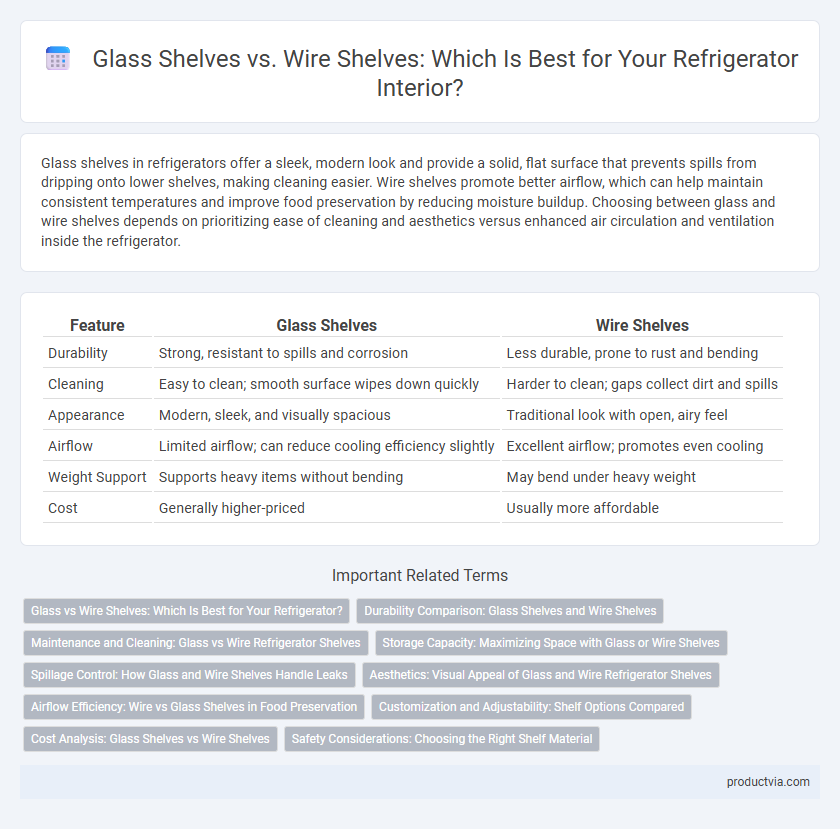Glass shelves in refrigerators offer a sleek, modern look and provide a solid, flat surface that prevents spills from dripping onto lower shelves, making cleaning easier. Wire shelves promote better airflow, which can help maintain consistent temperatures and improve food preservation by reducing moisture buildup. Choosing between glass and wire shelves depends on prioritizing ease of cleaning and aesthetics versus enhanced air circulation and ventilation inside the refrigerator.
Table of Comparison
| Feature | Glass Shelves | Wire Shelves |
|---|---|---|
| Durability | Strong, resistant to spills and corrosion | Less durable, prone to rust and bending |
| Cleaning | Easy to clean; smooth surface wipes down quickly | Harder to clean; gaps collect dirt and spills |
| Appearance | Modern, sleek, and visually spacious | Traditional look with open, airy feel |
| Airflow | Limited airflow; can reduce cooling efficiency slightly | Excellent airflow; promotes even cooling |
| Weight Support | Supports heavy items without bending | May bend under heavy weight |
| Cost | Generally higher-priced | Usually more affordable |
Glass vs Wire Shelves: Which Is Best for Your Refrigerator?
Glass shelves in refrigerators offer a sturdy, flat surface that prevents spills from dripping through, making cleanup easier and providing a modern aesthetic. Wire shelves allow better air circulation, promoting even cooling throughout the fridge, and are usually lighter, which makes adjusting shelves simpler. Choosing between glass and wire shelves depends on your preference for ease of cleaning versus enhanced airflow and weight considerations.
Durability Comparison: Glass Shelves and Wire Shelves
Glass shelves in refrigerators offer superior durability due to their solid construction and resistance to warping or bending under heavy loads. Wire shelves, while providing better air circulation, tend to be less durable as they can bend or rust over time with frequent use. The choice depends on whether long-lasting strength or improved airflow is prioritized in interior refrigerator design.
Maintenance and Cleaning: Glass vs Wire Refrigerator Shelves
Glass refrigerator shelves offer a smooth, non-porous surface that resists spills and stains, making them easier to wipe clean with a simple damp cloth or mild detergent. Wire shelves, with open grids, often trap crumbs and sticky residues, requiring more frequent and thorough scrubbing or removal for deep cleaning. Glass shelves typically provide a low-maintenance option, while wire shelves demand more attention to maintain hygiene and appearance.
Storage Capacity: Maximizing Space with Glass or Wire Shelves
Glass shelves in refrigerators provide a smooth, flat surface that maximizes usable storage space by allowing easy stacking and preventing small items from falling through gaps. Wire shelves offer more airflow, which can help keep food fresher, but their open design reduces continuous surface area, limiting storage capacity for smaller or unevenly shaped items. Choosing glass shelves optimizes overall space utilization, while wire shelves prioritize ventilation and freshness.
Spillage Control: How Glass and Wire Shelves Handle Leaks
Glass shelves in refrigerators provide superior spillage control by containing leaks within their smooth, non-porous surface, making it easier to wipe up spills without liquid seeping through. Wire shelves, with their open-grid design, allow liquids to drip through, potentially causing messes on lower shelves or the refrigerator floor. For households prioritizing easy cleanup and preventing cross-shelf contamination, glass shelves offer a more hygienic and convenient solution compared to wire shelves.
Aesthetics: Visual Appeal of Glass and Wire Refrigerator Shelves
Glass shelves in refrigerators offer a sleek, modern look that enhances interior visibility and creates a sense of spaciousness. Wire shelves provide a more utilitarian appearance, often perceived as less refined but allowing better air circulation for optimal cooling. The choice between glass and wire shelves significantly influences the overall aesthetic and perceived quality of the refrigerator interior.
Airflow Efficiency: Wire vs Glass Shelves in Food Preservation
Wire shelves in refrigerators enhance airflow efficiency by allowing cold air to circulate freely around stored items, promoting even cooling and reducing hotspots that can accelerate food spoilage. Glass shelves, while offering a solid surface that prevents smaller items from falling through, tend to restrict air circulation, potentially leading to uneven temperatures and faster degradation of perishable foods. Optimizing airflow with wire shelves improves temperature consistency, maintaining food freshness and extending shelf life in the refrigerator interior.
Customization and Adjustability: Shelf Options Compared
Glass shelves offer a sleek, durable surface that supports heavier items and can be easily cleaned, making them ideal for customizable storage arrangements. Wire shelves provide better airflow and flexibility in spacing, allowing adjustable placement to accommodate varied item sizes and maximize interior volume. Choosing between glass and wire shelves depends on the desired balance between sturdy storage and adaptable ventilation within the refrigerator.
Cost Analysis: Glass Shelves vs Wire Shelves
Glass shelves typically cost more than wire shelves due to the material's durability, ease of cleaning, and aesthetic appeal, with prices ranging from $50 to $150 per shelf compared to $20 to $60 for wire shelves. Wire shelves are generally less expensive and offer better air circulation but may require more frequent replacement due to wear and rust. Considering long-term value, glass shelves provide higher upfront costs but can reduce maintenance expenses and contribute to a modern refrigerator interior design.
Safety Considerations: Choosing the Right Shelf Material
Glass shelves in refrigerators offer a sturdy and spill-resistant surface that enhances safety by preventing leaks from contaminating lower compartments, while their tempered design minimizes shattering risks. Wire shelves provide better air circulation within the refrigerator, reducing the chances of mold and bacteria growth, but may pose safety concerns if heavy items cause bending or if sharp edges are exposed. Selecting the right shelf material depends on balancing durability, ease of cleaning, and minimizing injury hazards, with tempered glass often favored for its strength and hygienic properties.
Glass shelves vs Wire shelves for refrigerator interior Infographic

 productvia.com
productvia.com